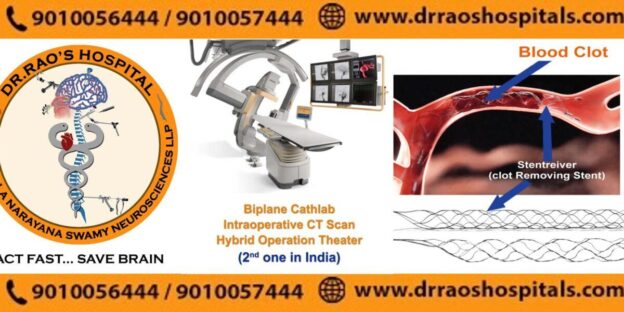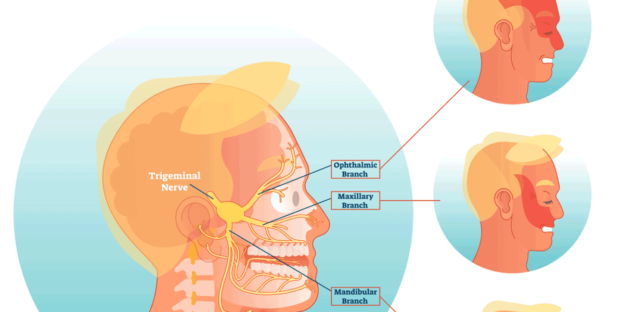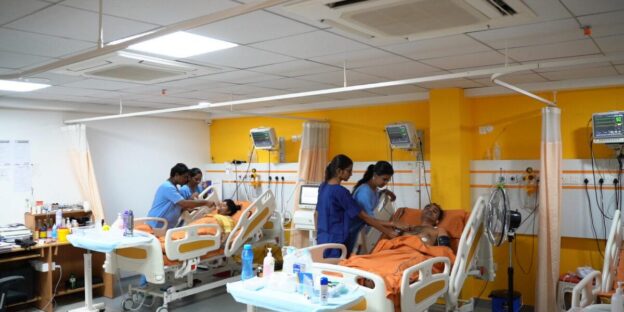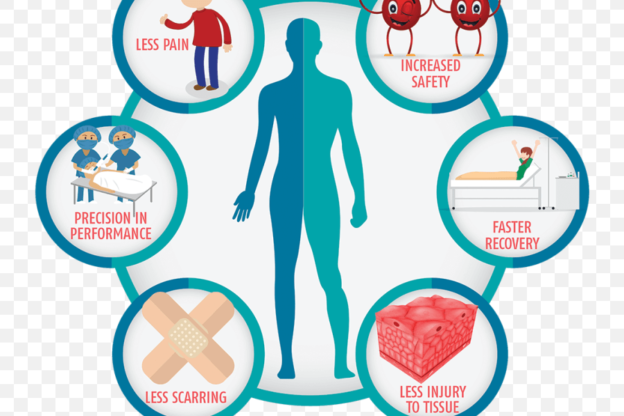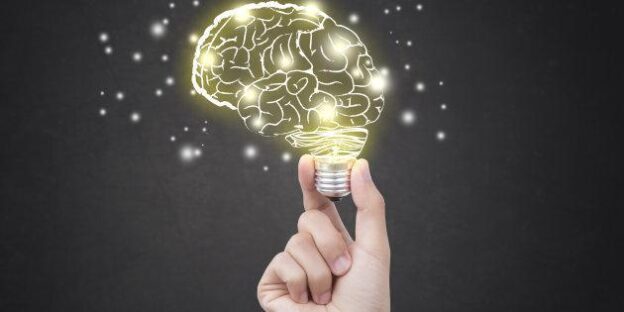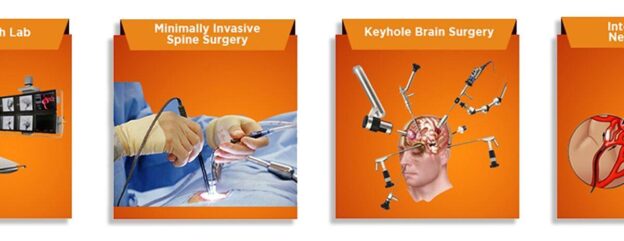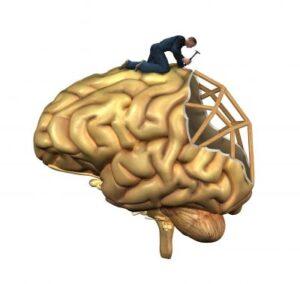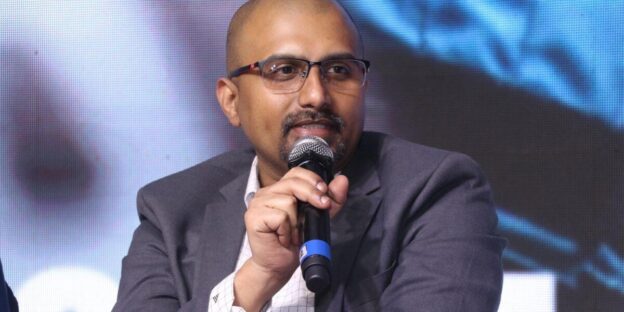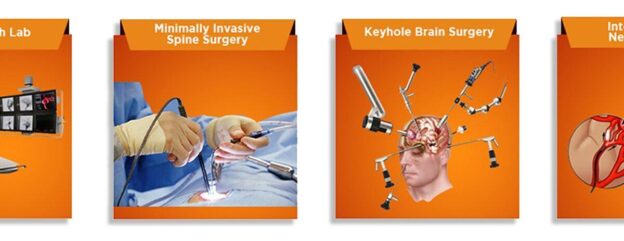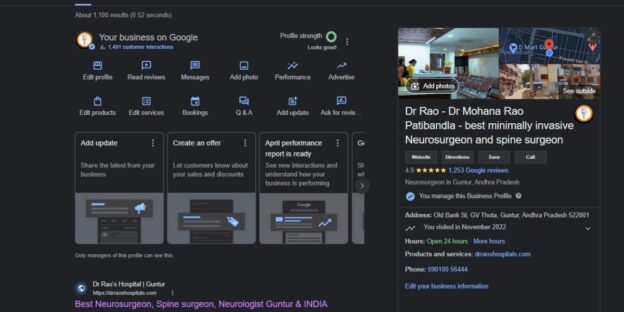Stroke Care: The best stroke treatment by Dr. Raos Hospital
Title: Understanding Stroke: Types, Causes, Treatment, and Living Beyond
Discover the transformative impact of Dr. Rao, a renowned stroke specialist, and his premier hospital in Guntur and India. Explore comprehensive stroke care, from diagnosis to rehabilitation, and embrace a life of empowerment.
Introduction
A stroke is a severe medical condition when the blood supply to the brain is disrupted, leading to brain cell damage or death. This comprehensive blog will explore the definition, types, causes, risk factors, diagnosis, acute management, prevention strategies, and living with stroke. We will also highlight the expertise of Dr. Rao, a renowned stroke specialist, and the exceptional care provided at Dr. Rao’s hospital, the leading healthcare institution in Guntur and India.
Stroke: An Overview
A stroke is a severe medical condition that occurs when the blood supply to the brain is disrupted, leading to the damage or death of brain cells. It is vital to understand the definition of stroke, its impact on the brain, and the different types of stroke.
Definition of Stroke:
A stroke, also known as a cerebrovascular accident (CVA), occurs when the blood flow to a part of the brain is interrupted or reduced. This interruption can be caused by a blood clot (ischemic stroke) or bleeding from a ruptured blood vessel (hemorrhagic stroke). Brain cells begin to die within minutes when the brain does not receive enough oxygen and nutrients due to disrupted blood flow.
Types of Stroke:
There are three main types of stroke: ischemic stroke, hemorrhagic stroke, and transient ischemic attack (TIA). Understanding the differences between these types is crucial for effective diagnosis and treatment.
Ischemic Stroke:
Ischemic stroke is the most common stroke, accounting for about 85% of all cases. It occurs when a blood clot or plaque buildup blocks a blood vessel supplying the brain. As a result, the affected brain area is deprived of oxygen and nutrients, leading to cell damage. Ischemic stroke can be further categorized into thrombotic stroke and embolic stroke.
- Thrombotic Stroke: This type of ischemic stroke occurs when a blood clot forms within one of the brain’s arteries. It often develops in areas where the arteries have been narrowed or damaged by atherosclerosis, a condition characterized by the buildup of fatty deposits.
- Embolic Stroke: An embolic stroke occurs when a blood clot or other debris forms elsewhere in the body (usually in the heart or neck) and travels to the brain, blocking a blood vessel. The clot or debris is called an embolus.
Hemorrhagic Stroke:
Hemorrhagic stroke accounts for approximately 15% of all stroke cases and occurs when a blood vessel in the brain ruptures, causing bleeding into the surrounding brain tissue. The two main types of hemorrhagic stroke are intracerebral hemorrhage and subarachnoid hemorrhage.
- Intracerebral Hemorrhage: This type of hemorrhagic stroke occurs when a blood vessel within the brain ruptures, leading to bleeding within the brain tissue. It is often caused by high blood pressure, trauma, or an abnormal blood vessel rupture.
- Subarachnoid Hemorrhage: Subarachnoid hemorrhage occurs when there is bleeding in the space between the brain and the thin tissues covering the brain, called the subarachnoid space. The rupture of a cerebral aneurysm, a bulging or weakened area in the wall of a blood vessel, commonly causes it.
Transient Ischemic Attack (TIA):
A transient ischemic attack, often called a “mini-stroke,” is a temporary disruption of blood flow to the brain. It is similar to an ischemic stroke but resolves quickly, typically within 24 hours. TIAs should never be ignored, as they can serve as warning signs for a more severe stroke in the future.
Understanding the differences between ischemic, hemorrhagic, and transient ischemic attacks is crucial for prompt recognition, accurate diagnosis, and appropriate treatment. Each type requires specific management strategies to minimize damage, prevent recurrence, and optimize recovery.
In the following sections, we will delve deeper into the causes, risk factors, diagnosis, acute management, prevention strategies, and living with stroke, highlighting the expertise of Dr. Rao, a renowned stroke specialist.
Causes and Risk Factors
Understanding the causes and risk factors of stroke is crucial for effective prevention and management. This section will explore the common causes of stroke and modifiable and non-modifiable risk factors. We will also discuss the significant role of lifestyle choices in stroke prevention.
Common Causes of Stroke:
The two leading causes of stroke are blood clots (ischemic stroke) and ruptured blood vessels (hemorrhagic stroke).
- Ischemic Stroke: The most common cause of ischemic stroke is the formation of blood clots within the blood vessels supplying the brain. These clots may develop due to atherosclerosis, characterized by plaque buildup and fatty deposits on the arterial walls. The clots can block or narrow the blood vessels, reducing blood flow and oxygen supply to the brain.
- Hemorrhagic Stroke: Hemorrhagic stroke occurs when a blood vessel in the brain ruptures, causing bleeding into the surrounding brain tissue. This rupture can result from various factors, such as high blood pressure, trauma, or the rupture of an abnormal blood vessel known as a cerebral aneurysm.
Modifiable and Non-Modifiable Risk Factors:
Certain factors increase an individual’s risk of experiencing a stroke. These risk factors can be categorized as modifiable (can be changed or controlled) and non-modifiable (cannot be changed).
- Modifiable Risk Factors:
- Hypertension (High Blood Pressure): Uncontrolled high blood pressure is one of the leading risk factors for stroke. Regular monitoring and effective management of blood pressure are essential.
- Diabetes: Individuals with diabetes have a higher risk of stroke due to the impact of high blood sugar levels on blood vessels. Proper diabetes management is crucial.
- Smoking: Smoking damages blood vessels and increases the risk of stroke. Quitting smoking significantly reduces the risk.
- Obesity and Sedentary Lifestyle: Being overweight or obese and leading a sedentary lifestyle contribute to developing risk factors such as hypertension and diabetes. Regular physical activity and a healthy diet are vital for stroke prevention.
- High Cholesterol: Elevated levels of LDL (bad) cholesterol and low levels of HDL (good) cholesterol can lead to atherosclerosis and increase the risk of stroke. Maintaining healthy cholesterol levels through diet and medication can mitigate this risk.
- Non-Modifiable Risk Factors:
- Age: The risk of stroke increases with age. The risk doubles for each decade after the age of 55.
- Gender: Men have a higher risk of stroke than premenopausal women. However, the risk equalizes after menopause.
- Family History: A family history of stroke or certain genetic conditions can increase the risk of stroke.
The Role of Lifestyle Choices in Stroke Prevention:
Adopting a healthy lifestyle prevents stroke. Here are some lifestyle choices that can significantly reduce the risk:
- Balanced Diet: A diet rich in fruits, vegetables, whole grains, and lean proteins and low in saturated and trans fats is beneficial for stroke prevention. Limiting sodium intake can also help control blood pressure.
- Regular Physical Activity: Engaging in moderate-intensity aerobic exercises, such as brisk walking, swimming, or cycling, for at least 150 minutes per week can lower the risk of stroke.
- Smoking Cessation: Quitting smoking is one of the most impactful steps in stroke prevention.
- Limit Alcohol Consumption: Excessive alcohol consumption can raise blood pressure and increase the risk of stroke. It is recommended to moderate alcohol intake or avoid it altogether.
- Stress Management: Chronic stress can contribute to high blood pressure and other risk factors. Implementing stress management techniques such as relaxation
Diagnosis and Acute Management
Early diagnosis and prompt management are critical in mitigating the effects of a stroke. In this section, we will explore the importance of recognizing the signs and symptoms of stroke, seeking immediate medical attention, diagnostic tests used in stroke evaluation, acute management options, and the significance of timely intervention and rehabilitation.
Recognizing the Signs and Symptoms of Stroke:
Time is of the essence when it comes to stroke. Knowing the signs and symptoms can help individuals and their loved ones identify a stroke and seek medical help immediately. The acronym FAST (Face drooping, Arm weakness, Speech difficulty, Time to call emergency) can serve as a valuable tool for recognizing the signs of stroke:
- Face Drooping: One side of the face may droop or feel numb. The smile may appear uneven.
- Arm Weakness: One arm may feel weak or numb and drift downward when raised.
- Speech Difficulty: Speech may become slurred or difficult to understand. The person may struggle to repeat a simple sentence correctly.
- Time to Call Emergency: If any of these signs are present, it is crucial to call emergency services immediately, like 9010056444 or 9010057444.
Importance of Seeking Immediate Medical Attention:
In the event of a suspected stroke, time is of the essence. Rapid medical intervention can significantly improve outcomes and minimize long-term disability. Calling emergency services or going to the nearest stroke-ready hospital is crucial to receive timely treatment.
Diagnostic Tests:
To determine the type, extent, and cause of a stroke, healthcare professionals employ various diagnostic tests, including:
- CT Scan (Computed Tomography): A CT scan can quickly identify whether the stroke is ischemic or hemorrhagic, enabling medical professionals to decide the appropriate treatment course.
- MRI (Magnetic Resonance Imaging): An MRI provides detailed images of the brain, allowing healthcare providers to assess the extent of brain damage caused by stroke.
- Angiography: Angiography uses contrast dye and X-rays to visualize blood vessels in the brain. It can help identify blockages or abnormalities contributing to the stroke.
- Blood Tests: Blood tests may be conducted to assess blood clotting factors, cholesterol levels, and blood sugar levels, providing additional information about the underlying causes and associated risks.
Acute Management Options:
Acute management of stroke focuses on restoring blood flow to the brain, minimizing further damage, and preventing complications. The appropriate treatment options depend on the type of stroke:
- Ischemic Stroke:
- Intravenous Tissue Plasminogen Activator (IV tPA): IV tPA is a clot-busting medication administered within a specific time window, like 4.5 hours, to dissolve the blood clot causing the ischemic stroke.
- Mechanical Thrombectomy: In some instances, mechanical thrombectomy may be performed, which involves using specialized devices like stentreivers and aspiration catheters hooked to a suction pump to physically remove the blood clot and restore blood flow to the brain.
- Hemorrhagic Stroke:
- Hemorrhagic Stroke Evacuation: In severe cases, surgical intervention may be necessary to remove the blood clot or relieve pressure on the brain caused by bleeding.
- Embolization of AVM or Aneurysm: For specific cases, embolization procedures can block off abnormal blood vessels (AVM) or reinforce weakened blood vessel walls (aneurysm) to prevent further bleeding.
The Significance of Timely Intervention and Rehabilitation:
Timely intervention is crucial to minimize brain damage and improve outcomes. However, the journey to recovery extends beyond the acute phase. Rehabilitation is vital in maximizing functional abilities and promoting independence after a stroke. Rehabilitation programs may include physical, speech, occupational, and cognitive therapy. These programs aim to help individuals regain lost skills, relearn tasks, and adapt.
Prevention and Secondary Prevention
Preventing a first stroke and implementing measures to reduce the risk of recurrent stroke is essential for maintaining optimal health. This section will discuss strategies for preventing a first stroke, secondary prevention measures, and the significance of ongoing medical follow-up and adherence to treatment plans.
Strategies for Preventing a First Stroke:
Several lifestyle modifications and risk factor management strategies can significantly reduce the risk of experiencing a first stroke:
- Blood Pressure Control: High blood pressure is a leading risk factor for stroke. Regular monitoring, lifestyle changes, and medication prescribed by healthcare professionals can help maintain healthy blood pressure levels.
- Healthy Diet: Adopting a balanced diet that emphasizes fruits, vegetables, whole grains, lean proteins, and low-fat dairy products while limiting saturated and trans fats, cholesterol, and sodium can contribute to stroke prevention.
- Regular Exercise: Regular physical activity, such as aerobic exercises, strength training, or moderate-intensity activities, can improve cardiovascular health and reduce the risk of stroke.
- Smoking Cessation: Quitting smoking is vital for stroke prevention. Support from healthcare professionals, counseling services, or smoking cessation programs can assist individuals in achieving long-term success.
- Moderate Alcohol Consumption: Excessive alcohol consumption increases the risk of stroke. If alcohol is consumed, it should be done in moderation, following recommended guidelines.
- Weight Management: Maintaining a healthy weight through a balanced diet and regular exercise is crucial for stroke prevention.
Secondary Prevention Measures:
For individuals who have already experienced a stroke or transient ischemic attack (TIA), secondary prevention measures are essential to prevent recurrence. These measures may include:
- Medications: Depending on the underlying cause and risk factors, healthcare professionals may prescribe medications to manage blood pressure, control blood sugar levels (if diabetic), lower cholesterol, and prevent blood clot formation.
- Lifestyle Modifications: Implementing healthy lifestyle choices, including a balanced diet, regular exercise, smoking cessation, and moderation in alcohol consumption, remains crucial for secondary stroke prevention.
- Addressing Underlying Conditions: Managing underlying conditions such as atrial fibrillation (an irregular heart rhythm), carotid artery disease, and other cardiovascular disorders is essential to reduce the risk of recurrent stroke.
Importance of Ongoing Medical Follow-up and Adherence to Treatment Plans:
After experiencing a stroke or TIA, ongoing medical follow-up and treatment plans are essential for optimal management and prevention. Regular visits to healthcare professionals allow for monitoring risk factors, medication adjustments, and timely interventions. Adherence to prescribed medications, lifestyle modifications, and recommended therapies significantly reduces the risk of recurrent stroke.
Additionally, ongoing education and support from healthcare professionals can empower individuals to participate in their stroke prevention journey. Understanding the importance of long-term care and maintaining a solid partnership with healthcare providers is critical to achieving positive outcomes.
In the following sections, we will explore the topic of living with stroke, shedding light on the expertise of Dr. Rao, a renowned stroke specialist in Guntur and India, and the exceptional care provided at Dr. Rao’s hospital in Guntur, which is known for its excellence in stroke management.
Living with Stroke
Recovering from a stroke and adapting to life after the event can be a significant challenge for stroke survivors and their loved ones. In this section, we will explore the physical, emotional, and cognitive challenges stroke survivors face, the importance of rehabilitation therapies, the role of support networks and community resources, and strategies for promoting independence and quality of life post-stroke.
Physical, Emotional, and Cognitive Challenges:
Stroke can result in various physical, emotional, and cognitive challenges impacting daily life. Common physical challenges include weakness or paralysis on one side of the body, difficulties with balance and coordination, and challenges with mobility. Emotional challenges such as depression, anxiety, and frustration may arise due to changes in lifestyle, limitations in activities, or the overall impact of the stroke. Cognitive challenges manifest as memory, attention, problem-solving, and communication difficulties.
Rehabilitation Therapies:
Rehabilitation is crucial in helping stroke survivors regain function and improve their overall quality of life. Rehabilitation therapies may include:
- Physical Therapy: Physical therapists work with stroke survivors to improve strength, coordination, balance, and mobility through exercises and specialized techniques.
- Speech Therapy: Speech-language pathologists assist individuals with stroke-related speech and language difficulties and swallowing difficulties.
- Occupational Therapy: Occupational therapists help stroke survivors regain independence in performing activities of daily living, such as dressing, grooming, and feeding, as well as improving cognitive and fine motor skills.
These therapies are tailored to each individual’s needs and goals and are typically conducted in collaboration with a multidisciplinary team of healthcare professionals.
Support Networks and Community Resources:
A strong support network is vital for stroke survivors and their caregivers. Family, friends, and support groups can provide emotional support, encouragement, and practical assistance during recovery. Community resources, such as stroke support organizations and advocacy groups, can offer additional guidance, education, and access to valuable resources for stroke survivors and their families.
Promoting Independence and Quality of Life Post-Stroke:
Various strategies and interventions encourage independence and enhance stroke survivors’ overall quality of life. These may include:
- Assistive Devices: Assistive devices such as canes, walkers, or wheelchairs can assist with mobility and enhance independence.
- Home Modifications: Adapting the home environment to accommodate the needs of the stroke survivor, such as installing grab bars, ramps, or modified bathroom fixtures, can improve safety and accessibility.
- Cognitive Rehabilitation: Cognitive exercises and strategies can help improve memory, attention, problem-solving, and communication skills.
- Emotional Support: Engaging in counseling or therapy sessions can assist stroke survivors in managing emotional challenges and developing coping strategies.
- Healthy Lifestyle Choices: Maintaining a nutritious diet, engaging in regular physical activity (as recommended by healthcare professionals), managing stress, and getting sufficient rest to contribute to overall well-being and recovery.
By combining the support of healthcare professionals, rehabilitation therapies, and a supportive network, stroke survivors can enhance their independence, regain confidence, and improve their quality of life.
In the next section, we will highlight the expertise of Dr. Rao, a prominent stroke specialist in Guntur and India, and the exceptional care provided at Dr. Rao’s hospital, which is renowned for its commitment to stroke management and rehabilitation.
Dr. Rao: A Leading Stroke Specialist
Dr. Rao is a highly accomplished and renowned stroke specialist with extensive experience in neurology and stroke care. This section will delve into Dr. Rao’s expertise in stroke diagnosis, treatment, and management, highlighting his commitment to patient-centered care and achieving optimal outcomes.
Expertise in Stroke Diagnosis, Treatment, and Management:
Dr. Rao possesses exceptional expertise in diagnosing and treating stroke, utilizing advanced diagnostic techniques and state-of-the-art technology to ensure accurate and timely assessments. With a deep understanding of the complexities of stroke, Dr. Rao employs a comprehensive approach to evaluate each patient’s condition and tailor an individualized treatment plan.
Dr. Rao’s broad knowledge and experience enable him to identify the type and cause of stroke, whether ischemic, hemorrhagic, or transient ischemic attack (TIA). This expertise allows him to make informed decisions regarding the most suitable acute management options, such as intravenous Tissue Plasminogen Activator (IV tPA), mechanical thrombectomy, hemorrhagic stroke evacuation, or embolization of arteriovenous malformations (AVMs) or aneurysms.
Furthermore, Dr. Rao is well-versed in the long-term management and secondary prevention of stroke. He recognizes the importance of ongoing care, lifestyle modifications, and adherence to treatment plans to reduce the risk of recurrent strokes and promote overall well-being.
Extensive Experience in Neurology and Stroke Care:
With years of experience in neurology and stroke care, Dr. Rao has demonstrated his commitment to advancing the field and improving patient outcomes. He has dedicated his career to staying at the forefront of the latest research, treatment modalities, and technological advancements in stroke management.
Dr. Rao’s extensive experience enables him to provide comprehensive and personalized care to each patient, considering their unique medical history, risk factors, and goals. His vast knowledge, coupled with a compassionate approach, instills confidence in his patients and their families, fostering a collaborative and supportive healthcare environment.
Commitment to Patient-Centered Care and Achieving Optimal Outcomes:
Dr. Rao strongly emphasizes patient-centered care, prioritizing open communication, empathy, and respect for individual preferences and needs. He believes in forming a partnership with his patients, involving them in decision-making processes, and educating them about their condition and available treatment options.
Dr. Rao strives to achieve optimal patient outcomes by fostering a patient-centered approach. He recognizes that every stroke survivor’s journey is unique and works closely with a multidisciplinary team to develop holistic care plans that address the physical aspects of recovery and the emotional and cognitive challenges accompanying stroke.
Dr. Rao’s commitment to excellence, unwavering dedication to his patients, and exceptional expertise in stroke care make him a trusted and respected figure in neurology and Neurosurgery. His contributions have profoundly impacted countless lives, empowering stroke survivors to regain independence and enhance their overall quality of life.
In the next section, we will explore the exceptional care provided at Dr. Rao’s hospital, which is widely recognized as a leading center for stroke management and rehabilitation in Guntur and India.
Dr. Rao’s Hospital: Excellence in Stroke Care
This section will explore Dr. Rao’s hospital, a premier healthcare institution in Guntur and India renowned for its excellence in stroke care. We will discuss the state-of-the-art facilities, advanced medical technologies, and multidisciplinary team approach contributing to the hospital’s exceptional stroke care services.
Overview of Dr. Rao’s Hospital as a Premier Healthcare Institution:
Dr. Rao’s Hospital is widely recognized as a leading neurology and stroke care center in Guntur and India. With a solid commitment to delivering the highest standard of healthcare, the hospital has earned a reputation for excellence, attracting patients from far and wide seeking advanced stroke management and rehabilitation services.
The hospital prides itself on its patient-centric approach, prioritizing the well-being and satisfaction of everyone who walks through its doors. Dr. Rao’s hospital’s compassionate and dedicated healthcare professionals strive to provide comprehensive and personalized care to stroke patients, ensuring optimal outcomes and an enhanced quality of life.
State-of-the-Art Facilities and Advanced Medical Technologies:
At Dr. Rao’s hospital, stroke patients benefit from state-of-the-art facilities and cutting-edge medical technologies that enable accurate diagnosis, precise treatment, and comprehensive rehabilitation. The hospital is equipped with advanced imaging equipment such as CT scanners, MRI machines, and angiography suites, allowing for detailed assessments of stroke cases.
The availability of these advanced technologies ensures prompt and accurate diagnoses, enabling the medical team to determine the most appropriate treatment strategies for each patient. This commitment to utilizing the latest medical advancements reflects the hospital’s dedication to delivering world-class stroke care.
Multidisciplinary Team Approach and Personalized Care for Stroke Patients:
Dr. Rao’s hospital follows an interdisciplinary approach to stroke care, bringing together experts from various specialties to collaborate on patient cases. This includes neurologists, neurosurgeons, interventional radiologists, physiotherapists, speech therapists, occupational therapists, and psychologists.
The multidisciplinary team collaborates to develop personalized care plans tailored to each patient’s needs and goals. By considering various aspects of stroke management, including acute interventions, rehabilitation therapies, and psychological support, the hospital ensures comprehensive and holistic care for stroke patients.
The personalized care provided at Dr. Rao’s hospital extends beyond medical treatments. Compassionate healthcare professionals understand stroke patients and their families physical, emotional, and cognitive challenges. They strive to create a supportive and nurturing environment, offering guidance, education, and emotional support throughout the patient’s journey.
In conclusion, Dr. Rao’s hospital is a beacon of excellence in stroke care, offering state-of-the-art facilities, advanced medical technologies, and a multidisciplinary team approach. The hospital’s commitment to personalized care ensures stroke patients receive comprehensive treatment and support, empowering them to regain their independence and improve their overall quality of life.
Conclusion:
In conclusion, understanding stroke is crucial for raising awareness about this life-altering condition. By exploring its definition, types, causes, risk factors, diagnosis, acute management, prevention, secondary prevention, and living with stroke, individuals can gain valuable insights into how to prevent and manage this condition. With advancements in medical science and the expertise of specialists like Dr. Rao, stroke care has reached new heights.
Dr. Rao, a leading stroke specialist, brings extensive experience and knowledge to the field of neurology. His commitment to patient-centered care and achieving optimal outcomes has earned him a reputation for excellence. With a deep understanding of stroke diagnosis, treatment, and management, Dr. Rao is dedicated to transforming lives and empowering patients on their journey to recovery.
At Dr. Rao’s hospital, stroke care is taken to a new level. As a premier healthcare institution in Guntur and India, the hospital boasts state-of-the-art facilities and advanced medical technologies. The multidisciplinary team at the hospital follows a personalized approach to providing exceptional care to stroke patients, ensuring their unique needs are addressed.
Living with a stroke can present various challenges, both physical and emotional. However, stroke survivors can regain their independence and improve their quality of life through rehabilitation therapies such as physical therapy, speech therapy, and occupational therapy. Support networks and community resources also play a vital role in helping stroke survivors adapt to their new reality and find strength in the journey.
In conclusion, stroke is a complex condition that requires comprehensive understanding, timely intervention, and dedicated care. With experts like Dr. Rao leading the way, stroke patients receive the highest medical attention and support. Dr. Rao’s hospital is a beacon of excellence, providing cutting-edge stroke care in Guntur and India. By raising awareness, promoting prevention strategies, and offering compassionate care, we can empower individuals to lead fulfilling lives after stroke.
Tags: Stroke, Dr. Rao, stroke care, neurology, rehabilitation, empowerment, Guntur, India, multidisciplinary care

